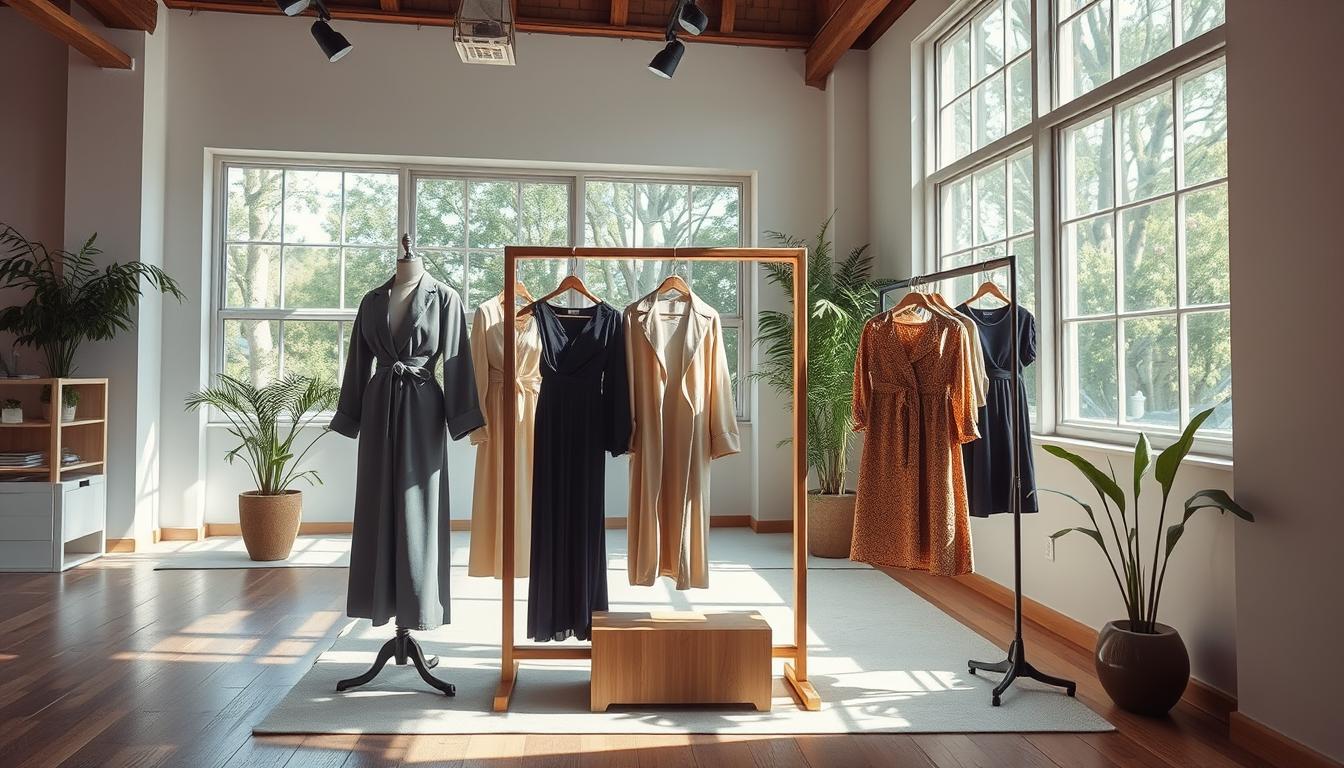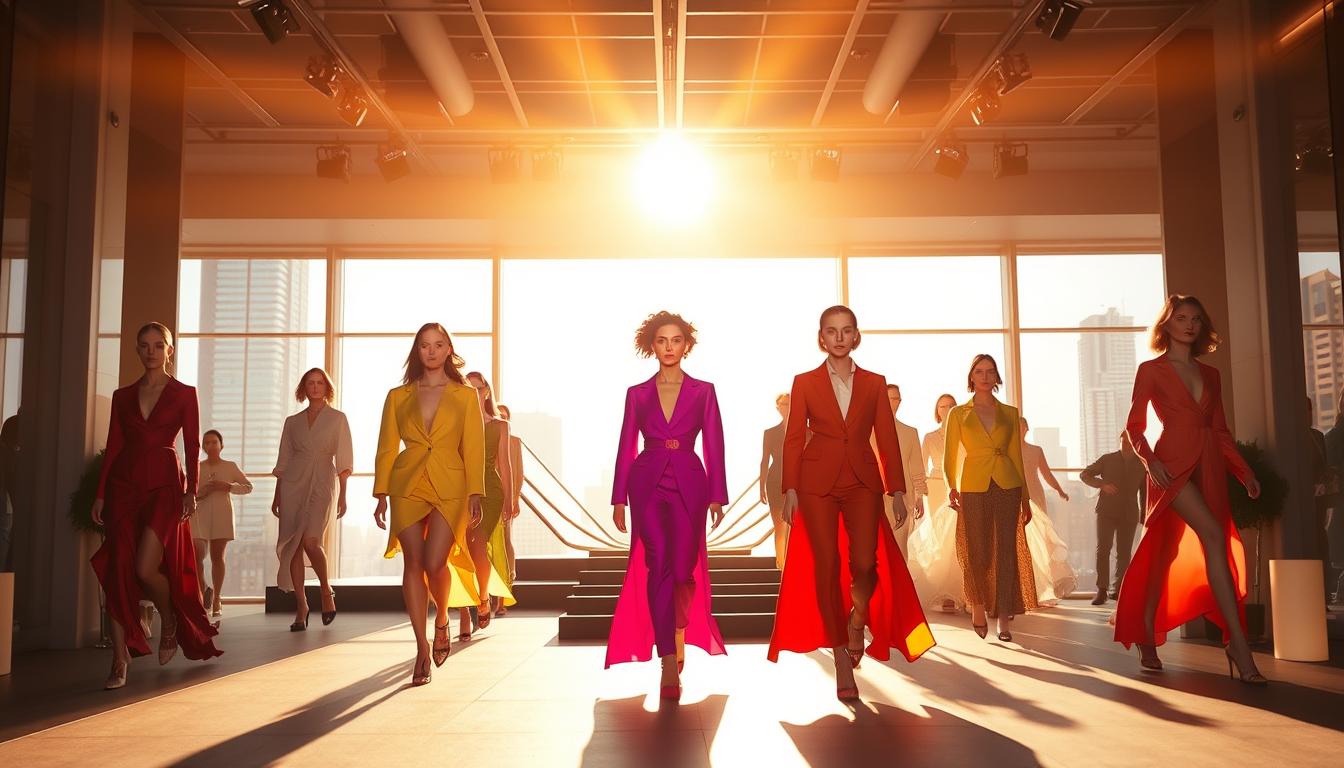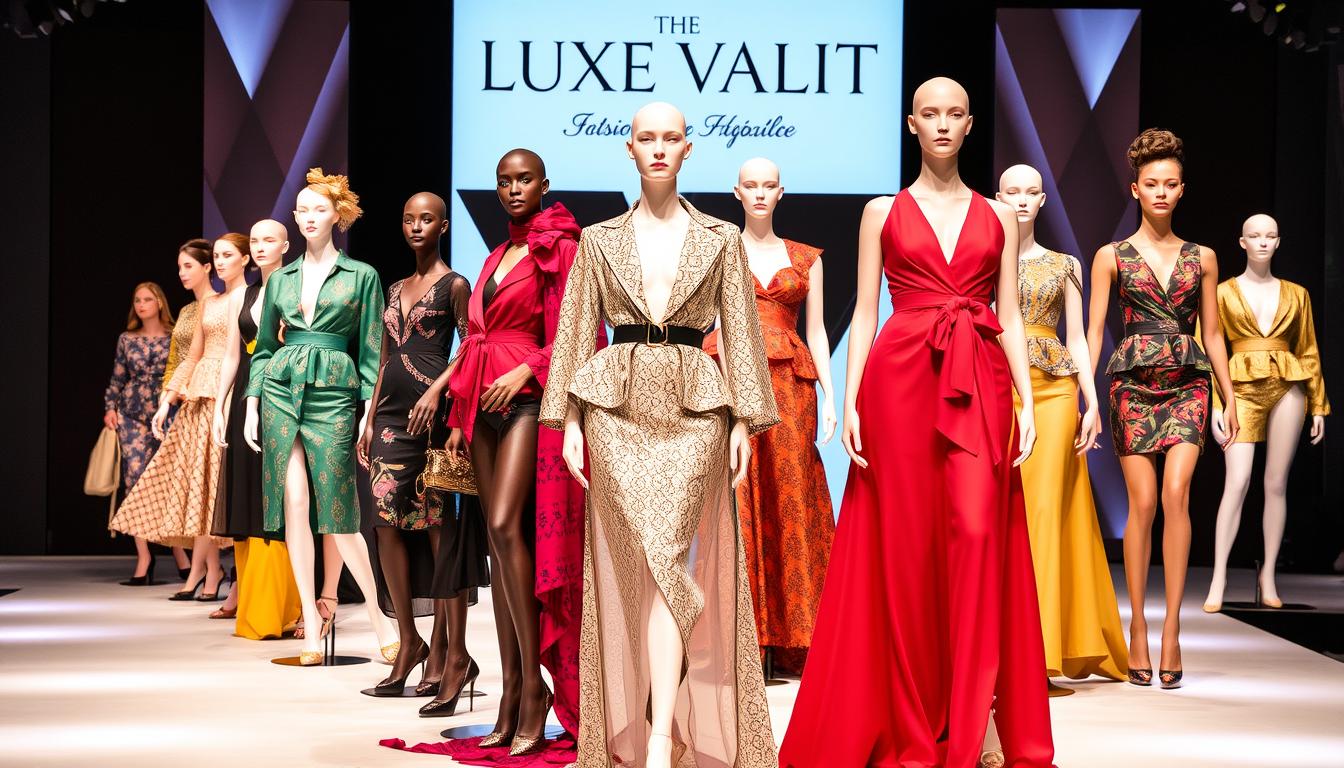The fashion industry is one of the largest polluters in the world, with the average American generating 82 pounds of textile waste per year. However, a growing number of consumers are seeking out sustainable clothing options that not only reduce environmental impact but also promote ethical practices.
We’re excited to explore the most reputable eco-friendly designer brands that are revolutionizing the fashion industry. These brands prioritize both style and environmental responsibility, making it easier to shop consciously.
By choosing to support these brands, consumers can promote a more sustainable future for fashion. We’ll highlight what makes these brands stand out, from their use of sustainable materials to their ethical manufacturing processes.
Key Takeaways
- Discover the top eco-friendly designer brands that prioritize sustainability and style.
- Learn about the sustainable materials and practices used by these brands.
- Find out where to shop for these eco-friendly brands online and in-store.
- Explore options for every budget, from affordable basics to luxury pieces.
- Understand how choosing sustainable fashion can impact the environment.
The Rise of Sustainable Fashion
As awareness about the environmental and social impacts of fast fashion grows, consumers are driving a revolution towards more ethical and sustainable clothing choices. This shift is not just about changing consumer behavior; it’s about transforming the entire fashion industry.
The COVID-19 pandemic has accelerated this trend, with consumers becoming more conscious about their purchasing decisions and the stories behind the clothes they wear. Studies have shown that a significant majority, 73% of millennials, are willing to pay more for ethical sustainable products, driving the growth of ethical fashion.
Understanding the Environmental Impact of Fast Fashion
Fast fashion’s environmental impact is substantial, involving massive trade networks that often prioritize speed and low costs over sustainability. The production and distribution of fast fashion contribute to pollution, waste, and carbon emissions. As consumers become more aware of these issues, they are seeking out brands that prioritize sustainability.
The Growing Demand for Ethical Designer Brands
The demand for ethical sustainable clothing is growing, driven by increased transparency and awareness about the fashion industry’s ethical issues. Social media, ethical influencers, and documentaries have all played a role in educating consumers and creating demand for brands that align with their values.
| Key Drivers | Impact on Fashion Industry |
|---|---|
| Increased consumer awareness | Growing demand for sustainable products |
| Social media and transparency | More brands adopting sustainable practices |
| Economic factors (COVID-19) | Accelerated shift towards conscious consumerism |
The ethical fashion market is projected to grow at a compound annual growth rate of 9.7% through 2025, reflecting a fundamental shift in consumer priorities. As consumers continue to drive this change, even conventional fashion brands are incorporating more sustainable practices, demonstrating the market power of conscious consumers.
What Makes a Fashion Brand Truly Eco-Friendly?
In the quest for a more sustainable future, understanding the characteristics of an eco-friendly fashion brand is crucial. As consumers, we’re becoming increasingly aware of the environmental and social impact of our purchasing decisions.
The fashion industry is one of the largest polluters globally, making the shift towards sustainability not just a trend, but a necessity. So, what sets an eco-friendly brand apart from others?
Sustainable Materials and Production Methods
A truly eco-friendly fashion brand prioritizes the use of sustainable materials in their products. This includes organic cotton, recycled polyester, and innovative materials made from plant-based sources.
These brands also adopt production methods that minimize environmental impact, such as using renewable energy in their manufacturing processes and reducing water waste.
Fair Labor Practices and Living Wages
Eco-friendly brands don’t just stop at environmental sustainability; they also ensure fair labor practices throughout their supply chains. This means providing workers with safe working conditions, fair wages, and reasonable working hours.
By doing so, these brands promote ethical clothing production that respects both the planet and its inhabitants.
Transparency in Supply Chain
One of the key characteristics of a genuinely eco-friendly brand is transparency in their supply chain. This involves openly sharing information about their manufacturing processes, material sourcing, and labor practices.
- Truly eco-friendly brands provide detailed information about their supply chains, often publishing reports on their factories, material sources, and production processes.
- They share the true costs behind their products, helping consumers understand the real value of sustainable ethical clothing compared to fast fashion alternatives.
- Some innovative brands are leveraging blockchain technology to track every step of their production process, from raw material to finished product.
By embracing transparency, these brands demonstrate their commitment to continuous improvement and accountability.
As we continue to navigate the world of sustainable fashion, it’s clear that transparency, fair labor practices, and sustainable materials are key to a brand’s eco-friendly credentials.
Yes Friends: Affordable Ethical Fashion
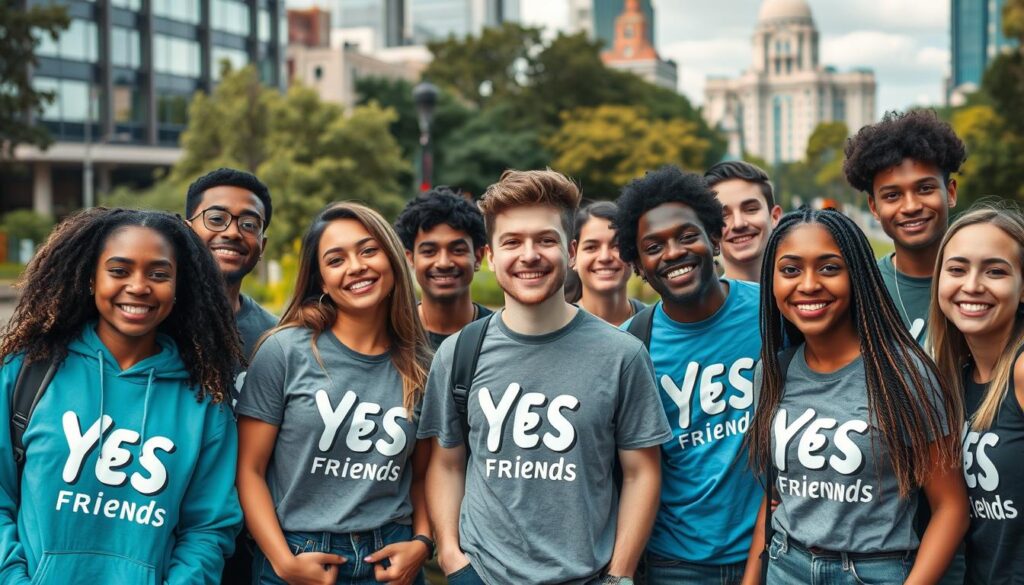
Yes Friends is redefining the fashion landscape by making ethical and sustainable clothing accessible to all. At the heart of their mission is a commitment to transforming the fashion industry through customer-driven design and production.
The Brand’s Mission to Transform the Fashion Industry
Yes Friends began its journey with a simple yet powerful idea: to create clothing that people truly want and will love for years to come. Before the brand even had a name, they conducted a poll among 100 people to understand their preferences for T-shirts. This initial step was just the beginning of a collaborative approach that continues to guide their product development process.
By involving customers directly in the design process, Yes Friends ensures that their collections are made to last and meet actual customer needs. This approach not only reduces waste but also fosters a sense of community around the brand.
Sustainable T-shirts at Accessible Prices
One of the key aspects of Yes Friends’ mission is to provide high-quality, sustainable T-shirts at prices that are accessible to a wide range of consumers. By optimizing their production processes and supply chain, they manage to keep costs low without compromising on the quality or ethics of their products.
The brand’s commitment to sustainability is reflected in their choice of materials and production methods, ensuring that their T-shirts are not only stylish but also environmentally friendly.
Customer-Driven Design Process
Yes Friends continues to engage with their customers through various channels, soliciting feedback on new styles and colors. This ongoing dialogue allows the brand to refine their designs and ensure that their products align with customer preferences.
On their collection pages, customers can view upcoming styles and provide input, making the shopping experience interactive and inclusive. This collaborative approach helps create an emotional connection between customers and products, increasing the likelihood that items will be kept and worn for years to come.
By working together with their customers, Yes Friends is building a collection of sustainable and ethical clothing that is both desirable and durable. Their innovative approach to fashion is setting a new standard for the industry, one that prioritizes both people and the planet.
MATE the Label: Clean Organic Essentials

Embracing the philosophy of ‘Dress Clean,’ MATE the Label offers a range of organic essentials that are both stylish and sustainable. Their commitment to using pesticide-free organic materials and responsible production methods is evident in every piece they create.
The “Dress Clean” Philosophy
MATE the Label’s “Dress Clean” philosophy is more than just a slogan; it’s a commitment to sustainability that permeates every aspect of their business. By focusing on organic materials and production methods, they significantly reduce their environmental footprint.
Sustainability is at the heart of MATE the Label’s mission, driving their innovation and design processes.
Pesticide-Free Organic Materials
The brand prioritizes the use of pesticide-free organic materials in their clothing lines. This not only ensures a healthier environment but also promotes better working conditions for farmers and laborers involved in the production process.
By choosing pesticide-free organic cotton, MATE the Label reduces the ecological impact of their products, making their clothes safer for consumers and the environment.
The Detox Your Closet Program
MATE the Label’s “Detox Your Closet” program is an innovative initiative that encourages customers to responsibly dispose of unwanted clothing items from any brand. Participants receive a $20 MATE shopping credit in return, fostering a culture of give back and sustainability.
This program addresses the critical issue of textile waste, promoting a more circular and responsible approach to fashion consumption. By accepting items from any brand, MATE demonstrates its commitment to industry-wide sustainability rather than just their own bottom line.
As consumers, we have the power to drive change through our purchasing decisions and disposal practices. MATE the Label’s initiatives encourage us to rethink our relationship with clothes and embrace a more sustainable future.
Stella McCartney: Luxury Meets Sustainability

Stella McCartney has been a trailblazer in merging luxury fashion with sustainability, setting a new standard for the industry. Her brand has been at the forefront of eco-friendly design, incorporating innovative materials and practices that minimize environmental impact.
Pioneering Ethical Luxury Fashion
Stella McCartney’s commitment to sustainability is evident in her brand’s mission to transform the luxury fashion industry. By prioritizing ethical production methods and sustainable materials, McCartney has redefined what it means to be a luxury fashion brand in the modern era.
Innovative Materials and Zero Waste Approach
The brand is known for its use of innovative, eco-friendly materials that reduce waste and minimize environmental harm. This approach not only benefits the planet but also results in unique and stylish sustainable clothing that appeals to consumers looking for high-end, eco-conscious fashion.
Celebrity Influence on Sustainable Fashion
Celebrities like Taylor Swift, Meghan Markle, and Emma Watson have frequently worn Stella McCartney’s designs on the red carpet, bringing attention to the brand’s sustainable practices. This celebrity influence has helped to mainstream sustainable fashion and encourage consumers to shop for eco-friendly luxury brands.
By associating sustainable fashion with luxury and glamour, Stella McCartney has helped shift perceptions about ethical clothing, making it more desirable and sophisticated. As a result, consumers are now more likely to seek out sustainable options when looking to shop for high-end fashion.
Nudie Jeans: Ethical Denim Pioneers
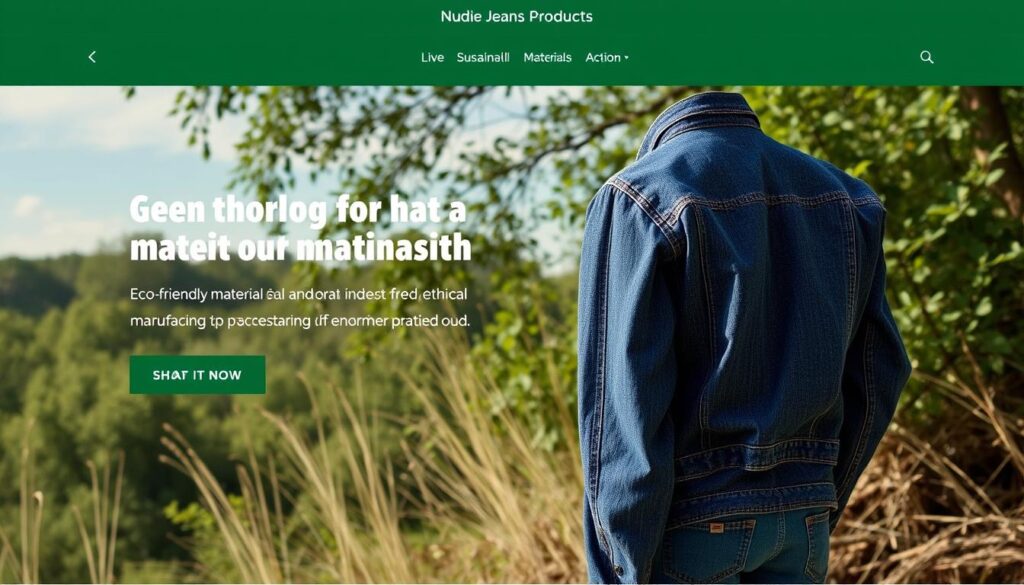
Nudie Jeans is redefining the denim landscape through its innovative approach to sustainability and ethics. As a pioneer in the industry, they have implemented various initiatives aimed at reducing environmental impact while promoting fair labor practices.
Organic Cotton Denim Production
Nudie Jeans prioritizes the use of organic cotton in their denim production. This choice significantly reduces the environmental footprint associated with cotton farming, such as water pollution and soil degradation. By opting for organic cotton, Nudie Jeans promotes a healthier ecosystem and supports sustainable agriculture.
The use of organic materials also ensures that their denim products are free from harmful chemicals, making them a safer choice for consumers. This commitment to organic cotton denim production is a crucial step towards minimizing the environmental impact of their supply chain.
Free Repair Services for Sustainable Consumption
Nudie Jeans offers a free repair service for their jeans, encouraging customers to extend the life of their products. This initiative helps reduce waste by repairing damaged jeans rather than discarding them. By promoting the repair and maintenance of their products, Nudie Jeans fosters a culture of sustainability among its customers.
This service not only reduces the need for new raw materials but also decreases the amount of waste generated by discarded denim. It’s a practical approach to sustainable consumption that aligns with Nudie Jeans’ overall mission to minimize environmental impact.
Recycling Program for Old Jeans
Nudie Jeans has implemented a comprehensive recycling program that accepts any of their jeans that are beyond repair. Customers are incentivized to participate through discounts on their next purchase. The collected denim is then transformed into new products through various upcycling processes, including limited edition rugs and patches for repairs.
This closed-loop approach addresses the end-of-life phase of their products, creating a circular system that minimizes waste and maximizes resource efficiency. By recycling old jeans and creating new products from recycled materials, Nudie Jeans is working towards its goal of achieving a zero waste business model.
Their Re-use collection features pre-owned Nudie jeans that have been washed, repaired, and resold at reduced prices, creating a formal second-hand market for their products. This initiative not only reduces waste but also makes sustainable fashion more accessible to a wider audience.
By implementing both repair and recycling programs, Nudie Jeans creates multiple pathways for extending the useful life of their products. This approach is crucial in the notoriously resource-intensive denim industry, where minimizing waste is a significant challenge. Nudie Jeans’ commitment to sustainability is evident in its efforts to reduce waste and promote recycling, making it a leader in ethical denim production.
Colorful Standard: Timeless Essentials

As consumers increasingly seek out sustainable fashion options, Colorful Standard is leading the way with its timeless, eco-friendly designs. The brand’s commitment to quality and sustainability is evident in every aspect of its production process.
Minimalist Design Philosophy
Colorful Standard’s design approach is centered around minimalism, creating clothing that is both simple and versatile. This philosophy not only reduces waste but also ensures that their pieces remain relevant over time, rather than being tied to fleeting trends.
By focusing on clean lines and classic designs, Colorful Standard encourages a quality over quantity approach to fashion consumption, aligning with their mission to make sustainable fashion accessible.
Organic Materials and Ethical Production
The brand prioritizes the use of organic materials in their clothing, ensuring that their products are not only stylish but also environmentally friendly. Their production methods are designed to minimize environmental impact while promoting fair labor practices.
By choosing organic materials and ethical production methods, Colorful Standard sets a high standard for sustainability in the fashion industry, offering consumers a guilt-free shopping experience when they shop with the brand.
Color Palette and Versatility
One of the standout features of Colorful Standard is its extensive color palette, offering over 40 carefully curated shades. This range allows customers to choose from a variety of styles that can be easily mixed and matched, creating a versatile wardrobe.
The brand’s color-matching system ensures consistency across different products, making it easy for customers to build a cohesive wardrobe over time. Additionally, Colorful Standard releases new seasonal colors that complement their permanent collection, providing customers with the opportunity to refresh their wardrobe without discarding previous purchases.
Frank and Oak: Innovative Sustainable Fashion
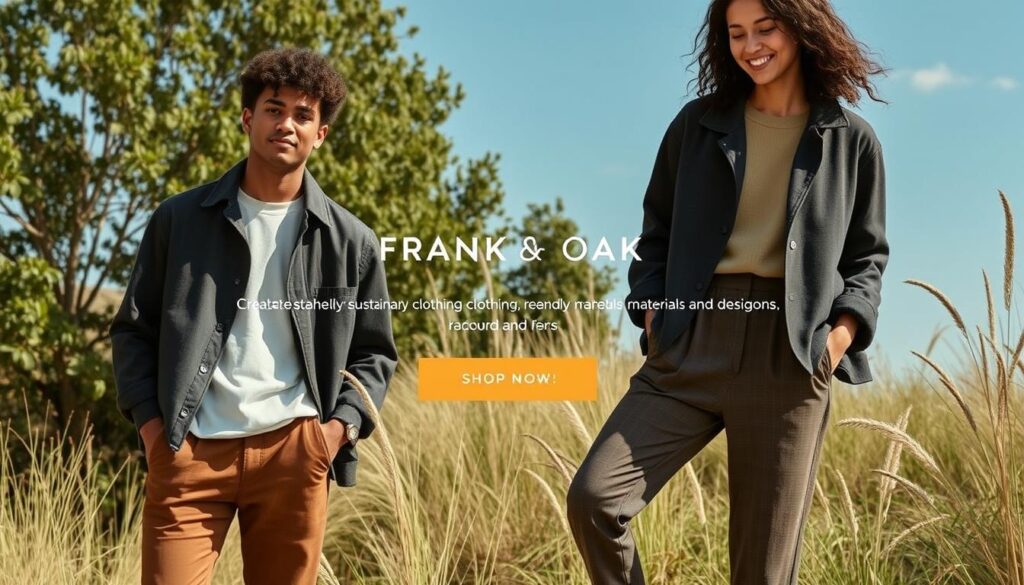
Frank and Oak is revolutionizing the fashion industry with its commitment to sustainability and innovative approaches to clothing production. We’re seeing a significant shift in how fashion brands operate, with sustainability at the forefront.
At the heart of Frank and Oak’s success is its circular fashion approach, designed to reduce waste and the environmental impact of clothing production.
Circular Fashion Approach
Frank and Oak’s circular fashion model encourages the reuse and recycling of clothing, minimizing the amount of waste sent to landfills. This approach not only benefits the environment but also fosters a more responsible consumption pattern among customers.
Recycled and Biodegradable Materials
The brand prioritizes the use of recycled and biodegradable materials in its clothing lines, significantly reducing the ecological footprint of its products. By choosing materials that are either recyclable or biodegradable, Frank and Oak promotes a healthier environment.
When you shop with Frank and Oak, you’re supporting a brand that values quality and styles that stand the test of time. Their commitment to sustainability doesn’t compromise on the aesthetic appeal or durability of their clothing.
Style Club Subscription Service
One of the innovative strategies Frank and Oak employs is its Style Club subscription service. This service allows members to receive a personalized selection of clothing items each month, try them at home, and only pay for what they keep. It’s a unique way to shop that reduces unnecessary purchases and returns, aligning with the brand’s mission to minimize waste.
By offering a curated shopping experience, Frank and Oak’s Style Club helps customers discover new styles while promoting sustainable consumption. Members can enjoy the convenience of having clothing tailored to their preferences, all while supporting a brand that prioritizes the planet’s well-being.
As we continue to explore sustainable fashion options, visiting the Frank and Oak website to shop their latest collections or to learn more about their Style Club is a great next step. You can shop with confidence, knowing you’re supporting a brand committed to quality and sustainability.
Where to Buy Eco-Friendly Designer Brands Online
Shopping for eco-friendly designer brands online has never been easier, with numerous platforms and brand websites offering a wide range of sustainable fashion options. As we continue to navigate the world of sustainable fashion, it’s essential to know where to shop for these high-quality, eco-friendly brands.
When looking for eco-friendly designer brands online, you’ll come across various platforms that cater to sustainable fashion. Let’s explore some of the most popular options.
Dedicated Sustainable Fashion Marketplaces
Dedicated sustainable fashion marketplaces have emerged as a one-stop-shop for eco-friendly fashion enthusiasts. These platforms curate a selection of brands that adhere to sustainable practices, making it easier for consumers to shop with confidence. You’ll find a diverse range of brands on these marketplaces, from affordable options to luxury labels, all committed to reducing their environmental footprint.
Some popular dedicated sustainable fashion marketplaces include those that feature a wide range of eco-friendly brands, offering everything from clothing to accessories. These platforms often provide detailed information about the brands and their sustainability initiatives, helping consumers make informed purchasing decisions.
Eco-Conscious Sections on Major Retailers
Many major retailers have begun to acknowledge the importance of sustainability by creating eco-conscious sections within their online stores. These sections feature products from brands that meet certain sustainability criteria, making it easier for consumers to shop for eco-friendly options. When shopping on major retailer websites, look for sections labeled as “sustainable” or “eco-friendly” to discover high-quality, environmentally conscious products.
By shopping on major retailer websites, you’ll often find a wide selection of eco-friendly products from various brands, making it a convenient option for those looking to shop sustainably.
Direct-to-Consumer Brand Websites
Shopping directly from eco-friendly designer brand websites is another excellent way to explore sustainable fashion. When you shop directly from a brand’s website, you’ll often find the most comprehensive selection of their products, including exclusive items not available through other retailers. Moreover, brand websites typically provide detailed information about their materials, production processes, and sustainability initiatives.
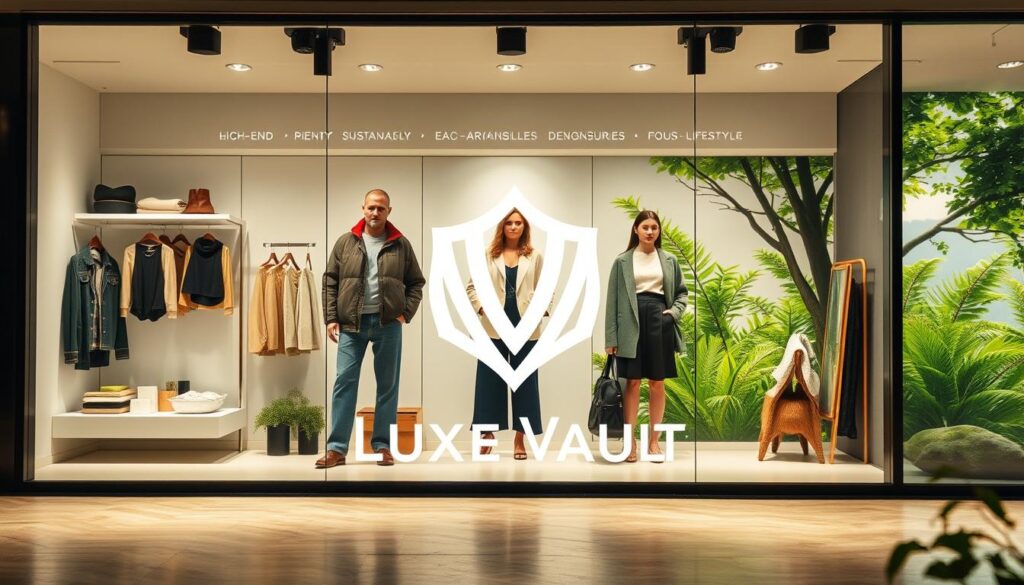
Many eco-friendly brands offer loyalty programs, pre-order options, and repair services exclusively through their websites, enhancing the customer relationship. By shopping direct-to-consumer, more of your purchase goes directly to the brand, supporting their sustainable practices and fair wage commitments.
As we explore the world of eco-friendly designer brands, it’s clear that there are numerous options available for consumers who want to shop sustainably. Whether you prefer dedicated sustainable fashion marketplaces, eco-conscious sections on major retailers, or direct-to-consumer brand websites, you’ll find a wide range of high-quality, eco-friendly products to suit your needs.
Sustainable Fashion for Different Budgets
The world of sustainable fashion is diverse, offering a range of choices for consumers with different budgets and style preferences. As the demand for eco-friendly clothing continues to grow, brands are responding by providing options across various price points.
Embracing sustainable fashion doesn’t mean compromising on style or breaking the bank. Whether you’re looking for affordable basics or luxury designer pieces, there’s a growing market that caters to your needs while prioritizing environmental and ethical considerations.
Affordable Eco-Friendly Brands
For budget-conscious consumers, there are several affordable eco-friendly brands that offer sustainable fashion without the hefty price tag. These brands use environmentally friendly materials, reduce waste, and implement fair labor practices, making it possible for anyone to shop sustainably. Some popular options include brands that offer recycled materials, organic cotton, and second-hand clothing.
Mid-Range Sustainable Options
The mid-range segment is where sustainability meets style and affordability. Brands in this category offer a balance between price and quality, providing consumers with the opportunity to invest in sustainable fashion that is both stylish and durable. When you shop from these brands, you’re supporting sustainable practices without straining your wallet.
Luxury Ethical Designer Labels
For those who prefer high-end fashion, luxury ethical designer labels like Stella McCartney offer the perfect blend of style, quality, and sustainability. These brands are pioneers in using innovative materials and production methods that minimize environmental impact. Investing in luxury sustainable fashion not only elevates your wardrobe but also supports luxury brands that prioritize ethics and sustainability.
When you choose to shop from these brands, you’re not only enhancing your personal style but also contributing to a more sustainable fashion industry.

Building a Sustainable Wardrobe: Beyond Brands
Embracing sustainable fashion means looking beyond the label to consider how our daily habits and choices impact the environment and our wardrobes. While choosing eco-friendly brands is a crucial step, building a truly sustainable wardrobe involves adopting a more mindful approach to fashion consumption.
One effective strategy is adopting the capsule wardrobe approach, which involves curating a small collection of essential pieces that can be mixed and matched to create multiple outfits. This approach not only reduces decision fatigue but also helps in minimizing waste by focusing on what we truly need.
The Capsule Wardrobe Approach
A capsule wardrobe encourages us to prioritize quality over quantity, investing in pieces that are timeless, versatile, and made to last. By doing so, we reduce the demand for fast fashion, which is a significant contributor to environmental degradation.
- Start with a cleanse: Begin by assessing your current wardrobe and removing items that are no longer worn or loved.
- Identify your style: Understand what works for you in terms of style, fit, and comfort.
- Invest in quality: Focus on purchasing a smaller number of high-quality, versatile pieces.
Quality Over Quantity Philosophy
Embracing the quality over quantity philosophy means being more discerning about the clothes we buy. It’s about valuing well-made, sustainable garments that may cost more upfront but offer long-term value.
When we prioritize quality, we’re not just making a statement about our personal style; we’re also supporting manufacturers that are committed to sustainability and ethical production practices.
Caring for Clothes to Extend Their Lifespan
Proper care of our clothes is crucial in extending their lifespan. Simple practices like washing in cold water, air-drying, and mending minor damages can significantly reduce waste and the environmental impact of our wardrobes.
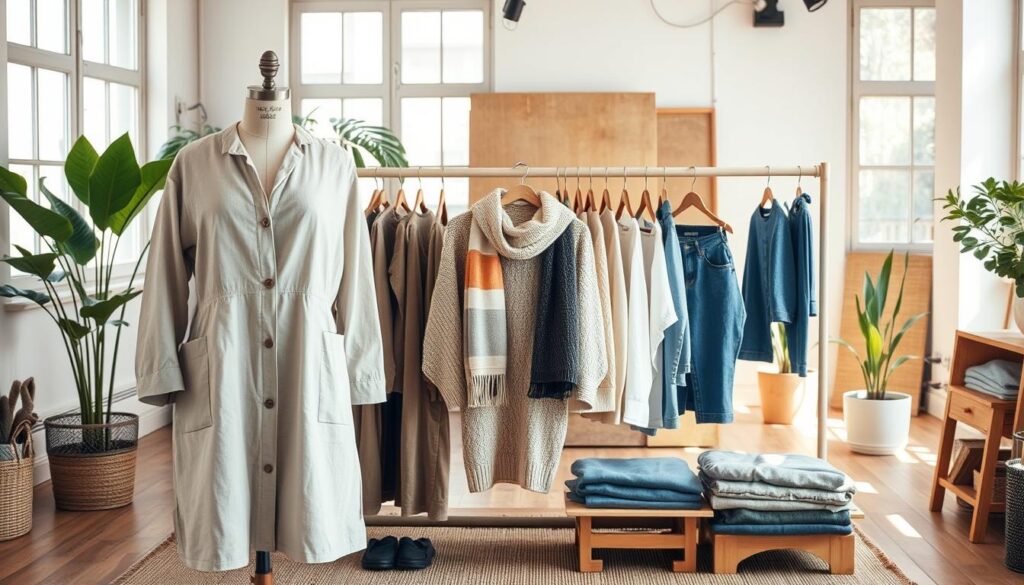
- Wash clothes in cold water to preserve colors and fabrics.
- Air-dry clothes instead of using a dryer to save energy and prevent shrinkage.
- Mend clothes to extend their life and reduce the need for new purchases.
By adopting these practices, we not only make our wardrobes more sustainable but also contribute to a broader cultural shift towards valuing quality and sustainability in fashion.
Navigating Greenwashing in Fashion
Greenwashing in the fashion industry has become a significant issue as companies increasingly use environmental claims to boost their brand image without necessarily backing these claims with substantial actions. This practice not only misleads consumers but also undermines the efforts of genuinely sustainable brands. As consumers, we’re faced with the challenge of distinguishing between brands that are truly committed to sustainability and those that are merely making claims.
Identifying Genuine Eco-Friendly Claims
One of the most effective ways to verify a brand’s sustainability claims is by looking for third-party certifications. Certifications like Global Organic Textile Standard (GOTS) for organic fibers and processing, Fair Trade Certified for worker rights and fair wages, and B Corp for overall social and environmental performance provide a level of assurance that goes beyond self-reported claims. These certifications require brands to meet specific standards and undergo regular audits, making them more reliable indicators of a brand’s commitment to sustainability.
Some key certifications to look out for include:
- GOTS for organic cotton and other organic fibers
- Fair Trade Certified for fair labor practices
- B Corp for comprehensive social and environmental standards
- OEKO-TEX Standard 100 for testing harmful substances
- Responsible Wool Standard for animal welfare
- Forest Stewardship Council for sustainable forestry practices
Common Misleading Marketing Tactics
Despite the growth of genuine sustainable fashion, many brands employ misleading marketing tactics to appear more eco-friendly than they actually are. Vague terms like “eco-friendly” or “sustainable” without specific details or evidence are red flags. Similarly, brands might highlight a single sustainable aspect of their product while ignoring other significant environmental impacts.
To avoid falling prey to greenwashing, it’s essential to look beyond marketing claims and examine a brand’s overall practices and policies.
Certifications and Standards to Look For
Understanding the different certifications and their focuses can help consumers make informed choices that align with their priorities, whether it’s environmental impact, labor rights, or chemical safety. Here’s a summary of key certifications and their main areas of focus:
| Certification | Main Focus |
|---|---|
| GOTS | Organic fibers and processing |
| Fair Trade Certified | Worker rights and fair wages |
| B Corp | Overall social and environmental performance |
| OEKO-TEX Standard 100 | Testing for harmful substances |
| Responsible Wool Standard | Animal welfare |
| Forest Stewardship Council | Sustainable forestry for plant-based fabrics |
By being aware of these certifications and understanding what they represent, consumers can make more informed purchasing decisions and support brands that are genuinely committed to sustainability.
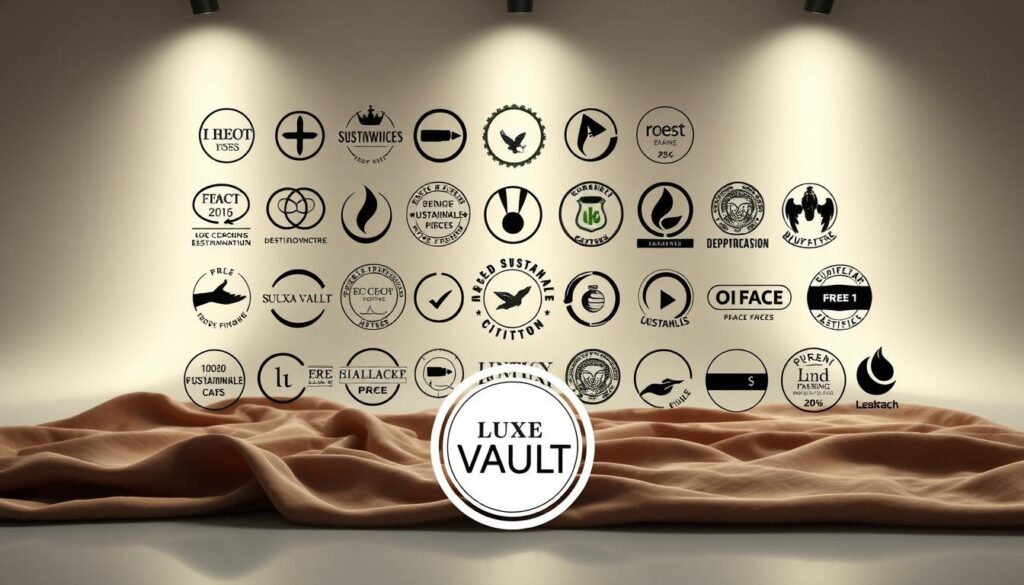
The Future of Sustainable Designer Fashion
The future of fashion is being shaped by a growing demand for sustainable and ethical practices. As consumers become more aware of the environmental and social impact of their purchasing decisions, the industry is responding with innovative solutions and a shift towards sustainability.
Emerging technologies are playing a crucial role in this transformation. From 3D printing to biodegradable materials, the fashion industry is leveraging cutting-edge technology to reduce its environmental footprint.
Innovative Production Methods
The adoption of emerging technologies in eco-friendly production is revolutionizing the fashion industry. Techniques such as digital printing and zero-waste design are minimizing waste and reducing the environmental impact of production processes.
| Technology | Application in Fashion | Environmental Benefit |
|---|---|---|
| 3D Printing | Customizable clothing and accessories | Reduces material waste |
| Biodegradable Materials | Production of sustainable fabrics | Decreases landfill waste |
| Digital Printing | Pattern and design creation | Minimizes water and chemical usage |
Circular Economy Models
The fashion industry is embracing circular economy models to promote sustainability. This approach encourages the reuse and recycling of clothing, reducing the need for new raw materials and minimizing waste.
According to Nielsen research, 73% of millennials are willing to pay more for sustainable products, driving the demand for circular fashion economy models. As consumers, we have the power to shape the industry through our purchasing decisions.
Consumer-Driven Changes
Consumer education and advocacy are accelerating the adoption of sustainable practices in the fashion industry. As people become more informed about the environmental impact of fashion, they are making conscious choices to prioritize ethics alongside aesthetics.
The rise of conscious consumerism is shifting power dynamics in the industry, forcing even reluctant brands to address sustainability to remain competitive. This consumer-driven transformation demonstrates how individual purchasing choices collectively create powerful market forces that can reshape entire industries.
How to Advocate for Sustainable Fashion
Advocating for sustainable fashion is not just about making eco-friendly purchases; it’s about creating a broader impact. As consumers, we have the power to influence the fashion industry’s practices and push for more sustainable and ethical standards. By taking a multifaceted approach, we can drive meaningful change and promote a more responsible fashion industry.
Supporting Ethical Brands Through Purchasing Power
One of the most direct ways to advocate for sustainable fashion is by supporting ethical brands through our purchasing power. By choosing to buy from brands that prioritize fair trade practices, use sustainable materials, and ensure transparency in their supply chains, we send a clear message to the industry about the importance of these values. This conscious consumerism encourages more brands to adopt sustainable practices, ultimately driving industry-wide change.
When shopping, look for brands that have made significant commitments to sustainability. Many brands now highlight their efforts to reduce environmental impact, improve labor conditions, and promote recycling. By supporting these brands, we’re not only reducing our own environmental footprint but also encouraging others to follow suit.
Engaging with Brands on Social Media
Engaging with brands on social media is another effective way to advocate for sustainable fashion. Social media platforms provide a direct line of communication between consumers and brands, allowing us to express our expectations and concerns. By praising brands that are making positive changes and calling out those that are not, we can influence their practices and policies.
Use social media to ask questions about a brand’s sustainability initiatives, labor practices, and environmental policies. Share content that highlights the importance of fair trade and sustainability in fashion. This not only raises awareness but also demonstrates consumer demand for more ethical and sustainable practices.
Community Involvement and Education
Community involvement is crucial for creating a broader impact in the pursuit of sustainable fashion. Participating in local clothing swaps, repair cafés, and sustainable fashion events helps build a community around ethical consumption. These activities provide practical alternatives to new purchases and foster a culture of sharing and caring for existing garments.
Organizing or participating in educational workshops and discussion groups can also help spread awareness about the environmental and social impact of the fashion industry. By educating others about the benefits of sustainable fashion and how to give back to the community through responsible consumption, we can create a ripple effect that extends beyond our individual actions.
| Action | Impact |
|---|---|
| Supporting Ethical Brands | Encourages industry-wide adoption of sustainable practices |
| Engaging on Social Media | Influences brand policies and raises awareness |
| Community Involvement | Fosters a culture of sustainability and reduces waste |
By taking these steps, we can collectively drive change in the fashion industry and promote a more sustainable future. Every action counts, and together, we can make a significant difference.
Sustainable Fashion Influencers to Follow
Sustainable fashion influencers are playing a crucial role in shaping consumer behavior and promoting ethical brands. These individuals are not only style guides but also educators and advocates for a more sustainable fashion industry.
Educational Content Creators
Educational content creators are at the forefront of the sustainable fashion movement. They produce content that informs and educates their audience about the environmental and social impacts of the fashion industry. For instance, Céline Semaan (@celinecelines), founder of Slow Factory Foundation, provides behind-the-scenes insights into sustainable manufacturing and materials innovation. Her work helps followers understand the complexities of sustainable production and the importance of ethical practices in the fashion industry.
Another notable example is Fashion Revolution (@fash_rev), which offers comprehensive resources on transparency and ethics in the fashion supply chain. Their annual Fashion Transparency Index rates major brands based on their transparency, providing consumers with valuable information to make informed purchasing decisions.
Stylists Specializing in Ethical Fashion
Stylists specializing in ethical fashion are redefining style by showcasing how to look great while doing good for the planet. They promote sustainable fashion by featuring eco-friendly brands and sharing tips on how to build a sustainable wardrobe. These stylists are crucial in making sustainable fashion accessible and desirable to a broader audience.
- The OR Foundation (@theorispresent) documents the global impact of clothing waste, particularly through their work in Kantamanto Market in Ghana, the world’s largest secondhand clothing market.
- Remake (@remakeourworld) combines investigative reporting with actionable campaigns that target specific industry practices, providing both education and concrete ways to get involved.
Industry Experts and Advocates
Industry experts and advocates play a vital role in pushing for systemic change within the fashion industry. They bring deep knowledge and insight into the challenges and opportunities in sustainable fashion, helping to drive the industry towards more sustainable practices. By following these experts, consumers can gain a deeper understanding of the broader systems and policies that need to change alongside individual purchasing habits.
These influencers connect personal choices to global impacts, helping sustainable fashion advocates understand how their actions fit into larger movements for environmental and social justice. As we look to the future of fashion, the work of these influencers will be crucial in shaping a more sustainable and equitable industry.
Conclusion: Making Eco-Friendly Fashion the New Normal
The rise of eco-friendly designer brands marks a significant shift towards a more sustainable fashion industry. As we’ve explored throughout this article, sustainable fashion is becoming increasingly accessible across various price points and style preferences. It’s not about achieving perfection but making progress, with each mindful purchase contributing to a more ethical and environmentally responsible fashion ecosystem.
Where we choose to shop for eco-friendly designer brands matters, as our collective purchasing power influences which business models thrive. Building a sustainable wardrobe is a journey that involves ongoing education, thoughtful consumption, and proper care for our existing clothing. True sustainability encompasses not only eco-friendly materials but also fair labor practices, transparent supply chains, and circular business models.
The future of fashion relies on consumers demanding better from brands and supporting those that prioritize sustainability. By doing so, we create market incentives for industry-wide transformation. For those looking to enhance their brand’s commitment to sustainability, CoWrit Technologies Inc offers comprehensive services, including Content Writing and Digital Marketing. You can reach them via WhatsApp at +44-7822010953 for assistance with developing sustainable brand messaging.
As we move forward, let’s remember that every individual’s choices contribute to a collective movement reshaping the fashion industry into one that respects both people and the planet. By choosing to shop from eco-friendly designer brands and supporting sustainable practices, we’re making eco-friendly fashion the new normal.
